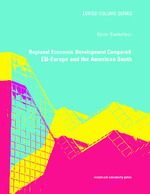Regional Economic Development Compared
EU-Europe and the American South
| dc.contributor.author | Bischof, Günter | |
| dc.date.accessioned | 2014-12-31 23:55:55 | |
| dc.date.accessioned | 2020-01-07 14:28:09 | |
| dc.date.accessioned | 2020-04-01T14:39:43Z | |
| dc.date.available | 2020-04-01T14:39:43Z | |
| dc.date.issued | 2014 | |
| dc.identifier | 503845 | |
| dc.identifier | OCN: 952619211 | en_US |
| dc.identifier.uri | http://library.oapen.org/handle/20.500.12657/33310 | |
| dc.description.abstract | "Comparing economic development in a regional context both in the South of the United States and in the European Union today raises many fascinating questions. How much money in the form of tax credits and subsidies should communities and states invest to attract foreign investors in the U.S.? Should individual states and communities in the U.S. commit public funds in the form of tax money and tax credits etc. to bring foreign businesses to their shores? Is the argument of bringing “jobs” and more employment home the only argument that should count politically? Or might these generous subsidies doled out to foreign businesses from public funds deprive local populations from improving their infrastructure and public education? What if these foreign investors then locate to other shores if their investments are not profitable enough in the short run? Might foreign investors come to the American South because it has never been unionized like the rest of the country? Is the attraction of the non-union South then only a means to get away from the burdens of stricter worker protection and social programs at home in Germany or Austria or elsewhere?" | |
| dc.language | English | |
| dc.subject.classification | thema EDItEUR::J Society and Social Sciences::JB Society and culture: general::JBC Cultural and media studies::JBCT Media studies | en_US |
| dc.subject.classification | thema EDItEUR::J Society and Social Sciences::JB Society and culture: general::JBS Social groups, communities and identities::JBSD Urban communities | en_US |
| dc.subject.classification | thema EDItEUR::K Economics, Finance, Business and Management::KC Economics | en_US |
| dc.subject.classification | thema EDItEUR::K Economics, Finance, Business and Management::KC Economics::KCS Economic systems and structures | en_US |
| dc.subject.classification | thema EDItEUR::K Economics, Finance, Business and Management::KF Finance and accounting::KFF Finance and the finance industry | en_US |
| dc.subject.classification | thema EDItEUR::K Economics, Finance, Business and Management::KN Industry and industrial studies::KNT Media, entertainment, information and communication industries | en_US |
| dc.subject.other | new orleans | |
| dc.subject.other | americas south | |
| dc.subject.other | economy | |
| dc.subject.other | amerikas süden | |
| dc.subject.other | wirtschaft | |
| dc.subject.other | EU | |
| dc.subject.other | USA | |
| dc.subject.other | economics | |
| dc.subject.other | ökonomie | |
| dc.subject.other | European Union | |
| dc.subject.other | Member state of the European Union | |
| dc.title | Regional Economic Development Compared | |
| dc.title.alternative | EU-Europe and the American South | |
| dc.type | book | |
| oapen.abstract.otherlanguage | Der Vergleich zwischen der wirtschaftlichen Entwicklung im Süden der USA und der EU im regionalen Kontext wirft eine Vielzahl von spannenden Fragen auf. Wie viel Geld sollten Gemeinden und Länder in Form von Förderungen und Steuererleichterungen in die Hand nehmen, um ausländische Investoren in die USA zu ziehen? Sollen die einzelnen amerikanischen Staaten und Gemeinden überhaupt öffentliche Gelder einsetzen, um ausländische Unternehmungen an Land zu ziehen? Genügt das Argument vieler PolitikerInnen, dass damit neue Arbeitsplätze in der Region geschaffen werden, oder ist es nicht vielmehr so, dass diese Mittel dann in anderen Bereichen wie Infrastruktur und Bildung fehlen? Und was geschieht, wenn die Unternehmer ihre Betriebe wieder ins Ausland abziehen, weil sie nicht genug profitieren? Zieht es ausländische Investoren in den Süden der USA, weil es hier im Gegensatz zu den anderen Staaten keine gewerkschaftlichen Organisationen gibt? Und sollen damit lediglich strikter Arbeiterschutz und soziale Unterstützungen, wie sie in Österreich oder Deutschland gang und gäbe sind, umgangen werden? | |
| oapen.identifier.doi | 10.26530/OAPEN_503845 | |
| oapen.relation.isPublishedBy | 7e4aa047-ebd5-4269-b6c8-a86925324b93 | |
| oapen.relation.isbn | 9783902936424 | |
| oapen.collection | AG Universitätsverlage | |
| oapen.pages | 100 | |
| oapen.redirect | 1000273 | |
| oapen.remark.public | Relevant Wikipedia pages: Economic development - https://en.wikipedia.org/wiki/Economic_development; European Union - https://en.wikipedia.org/wiki/European_Union; Member state of the European Union - https://en.wikipedia.org/wiki/Member_state_of_the_European_Union; New Orleans - https://en.wikipedia.org/wiki/New_Orleans | |
| oapen.identifier.ocn | 952619211 |

